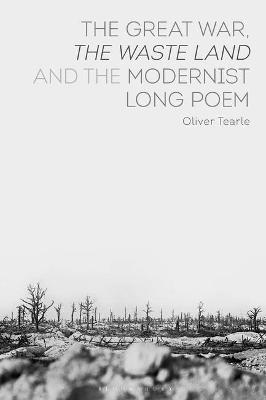
The Great War, The Waste Land and the Modernist Long Poem
(Hardback)
Publishing Details
The Great War, The Waste Land and the Modernist Long Poem
By (Author) Dr Oliver Tearle
Bloomsbury Publishing PLC
Bloomsbury Academic
10th January 2019
United Kingdom
Classifications
Tertiary Education
Non Fiction
Literary studies: poetry and poets
Literature: history and criticism
821.91209358
Physical Properties
Hardback
208
Width 156mm, Height 234mm
472g
Description
The Great War, The Waste Land and the Modernist Long Poem explores how cultural responses to the trauma of the First World War found expression in the form of the modernist long poem. Beginning with T.S. Eliots The Waste Land, Oliver Tearle reads that most famous example of the genre in comparison with lesser known long poems, such as Hope Mirrleess Paris: A Poem, Richard Aldingtons A Fool I the Forest and Nancy Cunards Parallax. As well as presenting a new history of this neglected genre, the book examines the ways in which the modernist long poem represented the seminal literary form for grappling with the crises of European modernity in the wake of World War I.
Reviews
[The Great War, The Waste Land and the Modernist Long Poem] virtues at both the micro and macro levelsits trenchant close readings and synoptic scoperecommend it to any serious reader of T. S. Eliot. * Time Present: The Newsletter of the International T. S. Eliot Society *
Draws pleasingly together canonical texts and works by under-analyzed modernist authors, offering for the first time a focused account of this form of post-war writing ... This book will be useful to scholars in First World War and modernist studies, and the well-defined and effectively developed central concepts of the long poem and homorhyme might also be used profitably in other contexts. * The Review of English Studies *
Oliver Tearle has done a good and timely job on bringing his reader back into the micro-climate of the poetry produced at the time by some of the twentieth century giants such as TS Eliot and Ezra Pound and their lesser known (today) contemporaries, including Ford Madox Ford (Antwerp, 1915), Hope Mirrlees (Paris: A Poem, 1920), Richard Aldington, (A Fool I the Forest: A Phantasmagoria (1925) from As You Like It: A fool, a fool! I met a fool i' the forest, / A motley fool; a miserable world!) and Nancy Cunard, (Parallax, 1925). * Dublin Review of Books *
In this engaging, learned study, Oliver Tearle takes for his subject what he calls a miniature genre-within-a-genre, the modernist long poem, and he seeks to explore the relation of this genre to the Great WarHis book provides an excellent introduction to all six poems. If at first this seems most valuable when it comes to Paris, A Fool i the Forest, and Parallax, the whole is yet greater than the parts, for the book offers a rich and compelling picture of modernist poetry in the decade after the Great War. -- Sean Pryor * Affirmations of the Modern *
Author Bio
Oliver Tearle is Lecturer in English at Loughborough University, UK. He is the author of T.E. Hulme and Modernism (Bloomsbury, 2013).
